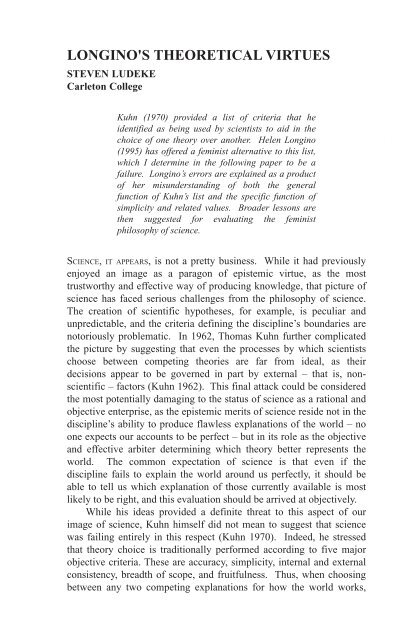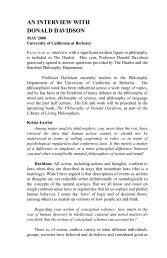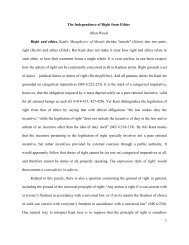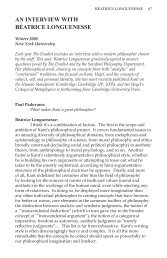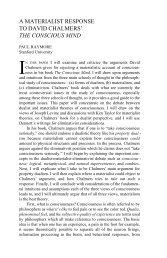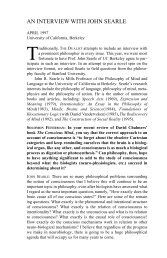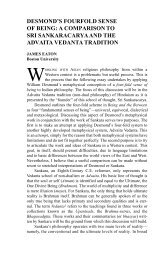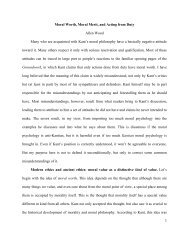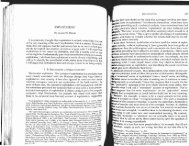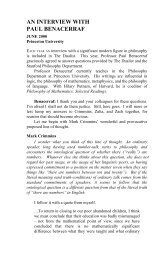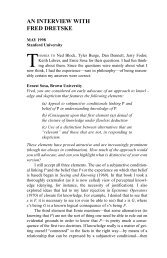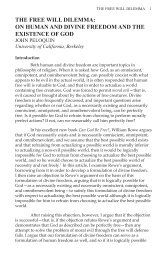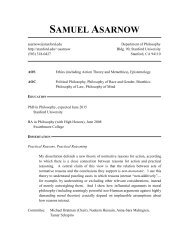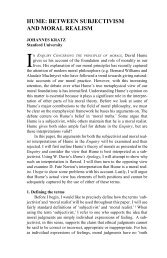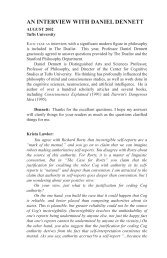longino's theoretical virtues - Stanford University Department of ...
longino's theoretical virtues - Stanford University Department of ...
longino's theoretical virtues - Stanford University Department of ...
You also want an ePaper? Increase the reach of your titles
YUMPU automatically turns print PDFs into web optimized ePapers that Google loves.
Title<br />
uthor<br />
hool<br />
agraph<br />
LONGINO'S THEORETICAL VIRTUES<br />
STEVEN LUDEKE<br />
Carleton College<br />
Kuhn (1970) provided a list <strong>of</strong> criteria that he<br />
identified as being used by scientists to aid in the<br />
choice <strong>of</strong> one theory over another. Helen Longino<br />
(1995) has <strong>of</strong>fered a feminist alternative to this list,<br />
which I determine in the following paper to be a<br />
failure. Longino’s errors are explained as a product<br />
<strong>of</strong> her misunderstanding <strong>of</strong> both the general<br />
function <strong>of</strong> Kuhn’s list and the specific function <strong>of</strong><br />
simplicity and related values. Broader lessons are<br />
then suggested for evaluating the feminist<br />
philosophy <strong>of</strong> science.<br />
Use s<strong>of</strong>t-returns<br />
to<br />
break lines<br />
with multiple<br />
Reme<br />
to put<br />
first th<br />
words<br />
SCIENCE, IT APPEARS, is not a pretty business. While it had previously<br />
enjoyed an image as a paragon <strong>of</strong> epistemic virtue, as the most<br />
trustworthy and effective way <strong>of</strong> producing knowledge, that picture <strong>of</strong><br />
science has faced serious challenges from the philosophy <strong>of</strong> science.<br />
The creation <strong>of</strong> scientific hypotheses, for example, is peculiar and<br />
unpredictable, and the criteria defining the discipline’s boundaries are<br />
notoriously problematic. In 1962, Thomas Kuhn further complicated<br />
the picture by suggesting that even the processes by which scientists<br />
choose between competing theories are far from ideal, as their<br />
decisions appear to be governed in part by external – that is, nonscientific<br />
– factors (Kuhn 1962). This final attack could be considered<br />
the most potentially damaging to the status <strong>of</strong> science as a rational and<br />
objective enterprise, as the epistemic merits <strong>of</strong> science reside not in the<br />
discipline’s ability to produce flawless explanations <strong>of</strong> the world – no<br />
one expects our accounts to be perfect – but in its role as the objective<br />
and effective arbiter determining which theory better represents the<br />
world. The common expectation <strong>of</strong> science is that even if the<br />
discipline fails to explain the world around us perfectly, it should be<br />
able to tell us which explanation <strong>of</strong> those currently available is most<br />
likely to be right, and this evaluation should be arrived at objectively.<br />
While his ideas provided a definite threat to this aspect <strong>of</strong> our<br />
image <strong>of</strong> science, Kuhn himself did not mean to suggest that science<br />
was failing entirely in this respect (Kuhn 1970). Indeed, he stressed<br />
that theory choice is traditionally performed according to five major<br />
objective criteria. These are accuracy, simplicity, internal and external<br />
consistency, breadth <strong>of</strong> scope, and fruitfulness. Thus, when choosing<br />
between any two competing explanations for how the world works,
52 STEVEN LUDEKE<br />
Kuhn suggested that scientists <strong>of</strong>ten behave appropriately, choosing one<br />
theory over another on the basis <strong>of</strong> objective and epistemologicallyrelevant<br />
considerations. These criteria generally were relevant for<br />
competing theories <strong>of</strong> any scale, grand or minute: whether they<br />
addressed the major questions <strong>of</strong> a field or were attempting to explain<br />
some particular detail, Kuhn’s criteria provided a rational basis by<br />
which to decide which account was more likely to be right.<br />
Kuhn was not the first or the last to attempt to define how<br />
scientists go about their business in respect to theory choice; but,<br />
perhaps for reasons more to do with the prestige <strong>of</strong> the author than the<br />
merits <strong>of</strong> his particular formulation, the criteria <strong>of</strong> theory choice as<br />
defined by Kuhn’s exposition appear now to be taken as fundamental,<br />
remaining the most commonly cited criteria for theory choice despite<br />
their apparent lack <strong>of</strong> originality or significant novel insight. However,<br />
I believe that despite their elevated status (or perhaps because <strong>of</strong> it), the<br />
criteria are widely known but poorly understood. Helen Longino<br />
(Longino 1995) may be an example <strong>of</strong> this, as I believe her proposal for<br />
additions (or perhaps outright replacements) 1 for Kuhn’s list <strong>of</strong> criteria<br />
show that she has misunderstood the logic behind the criteria on Kuhn’s<br />
list, and has made suggestions that are untenable upon an appropriate<br />
understanding <strong>of</strong> the criteria.<br />
Longino<br />
In “Gender, Politics, and the Theoretical Virtues,” Longino (1995)<br />
<strong>of</strong>fers six criteria that, “like the elements in Kuhn’s listÖ function as<br />
<strong>virtues</strong>, qualities <strong>of</strong> a theory, hypothesis, or model that are regarded as<br />
desirable and hence guide judgments between alternatives” (385). Her<br />
suggested criteria – empirical adequacy, novelty, ontological<br />
heterogeneity, complexity <strong>of</strong> interaction, applicability to human needs,<br />
and diffusion <strong>of</strong> power – are thus clearly intended to function in the<br />
same fashion as Kuhn’s criteria, as outlined above. Scientists are to<br />
compare two or more competing theories on each <strong>of</strong> the proposed<br />
criteria and declare one the victor, which is then deemed to be “right,”<br />
or, more cautiously, “more representative <strong>of</strong> reality.” And, as was also<br />
mentioned above, this process occurs at all levels <strong>of</strong> abstraction: in the<br />
choice between two explanations for how one particular protein turns<br />
into a different one, as well as in the evaluation <strong>of</strong> two competing<br />
accounts explaining the orbits <strong>of</strong> all celestial bodies.<br />
Longino <strong>of</strong>fers her revised guidelines for theory choice as an<br />
antidote to androcentric science. Where the values on the standard<br />
Kuhnian list are seen as inhibiting the development <strong>of</strong> a feminist<br />
science, Longino’s replacements are tailored to promote just such a
LONGINO'S THEORETICAL VIRTUES 53<br />
body <strong>of</strong> knowledge. “Feminist,” here, has a very particular meaning:<br />
while <strong>of</strong>ten bandied about in philosophy as referring to “a feminine<br />
orientation to the world” or an “outsider perspective,” Longino defines<br />
these values as feminist because <strong>of</strong> “the work these <strong>virtues</strong> can do for<br />
specifically feminist inquiryÖ The aim <strong>of</strong> revealing gender and/or the<br />
activities <strong>of</strong> women is, I propose, what makes inquiry feminist.<br />
Feminist <strong>theoretical</strong> <strong>virtues</strong> will be those that serve this aim” (Longino<br />
1995, 391). Kuhn’s <strong>virtues</strong>, then, are being rejected for their perceived<br />
failure to remove the stains <strong>of</strong> the West’s androcentric past from the<br />
current body <strong>of</strong> scientific theories. (Though at times Longino appears<br />
to be suggesting that many <strong>of</strong> Kuhn’s values are the stains themselves,<br />
representing an androcentric way <strong>of</strong> viewing the world – we’ll see how<br />
“simplicity” may be under attack on precisely these grounds.) The<br />
feminist revisions are here to clean up the house <strong>of</strong> science – perhaps<br />
staying on as permanent guests, as Longino appears convinced <strong>of</strong> their<br />
general utility in scientific reasoning. She is not alone in this<br />
conviction; indeed, her paper is largely a summary and defense <strong>of</strong> the<br />
theory choice criteria initially proposed by other prominent feminist<br />
philosophers <strong>of</strong> science. While this paper will focus on Longino’s<br />
claims in particular, then, the discussion also doubles as an evaluation<br />
<strong>of</strong> the general feminist position on theory choice.<br />
Before proceeding to analyze Longino’s list, there are two issues<br />
that must first be settled. One is the point that Longino’s list is quite<br />
clearly not an index <strong>of</strong> qualities that are useful only in theory choice as<br />
an epistemological enterprise. In determining which questions in<br />
science deserve fiscal priority, for example, the “applicability to human<br />
needs” is obviously considered. Similarly, in theory creation we value<br />
those researchers who break new ground – in Longino’s terms, suggest<br />
novel ideas – instead <strong>of</strong> just working within established theories. The<br />
usefulness <strong>of</strong> Longino’s values in these more pragmatic areas, however,<br />
does not entail that they are productive when brought into a discussion<br />
<strong>of</strong> purely epistemological theory choice. The question, then, is not the<br />
general productivity <strong>of</strong> these values or criteria, but rather their worth in<br />
the specific domain in question.<br />
The second issue concerns an alternative meaning <strong>of</strong> “theory<br />
choice.” While Longino is clear in stating that she intends the criteria<br />
she describes to function “like the elements in Kuhn’s list” in guiding<br />
epistemic judgments between competing theories, she introduces her<br />
final two criteria as being oriented instead around a more pragmatic<br />
version <strong>of</strong> theory choice. “Theory choice” in this context refers not to<br />
epistemic evaluation <strong>of</strong> competing theories with the aim <strong>of</strong> determining<br />
which theory is “right,” but to the pragmatic evaluation <strong>of</strong> which<br />
problems in science deserve more attention than others. 2 An example
54 STEVEN LUDEKE<br />
<strong>of</strong> the former is a biologist choosing between group selectionist and<br />
gene selectionist accounts for altruistic behavior; the latter process<br />
occurs more <strong>of</strong>ten in the boardrooms <strong>of</strong> grant foundations deciding<br />
whether to fund, say, research on ozone depletion or the treatment <strong>of</strong><br />
AIDS. 3<br />
This distinction between the two varieties <strong>of</strong> theory choice<br />
produces the second part <strong>of</strong> my thesis. My first claim, as described<br />
above, is that Longino’s values are not relevant to the<br />
epistemologically-concerned version <strong>of</strong> theory choice, 5 and that one<br />
would only think them to be so by misunderstanding the logic behind<br />
some <strong>of</strong> Kuhn’s criteria for theory choice; my second is that Longino’s<br />
criteria, while unproductive in this first version <strong>of</strong> theory choice, are in<br />
fact perfectly suited for the feminist practice <strong>of</strong> the pragmatic version<br />
<strong>of</strong> theory choice. I end with the suggestion that Longino’s work may<br />
be representative <strong>of</strong> much <strong>of</strong> the feminist philosophy <strong>of</strong> science, both<br />
in its particular errors and in the path for its eventual rehabilitation.<br />
Longino’s Values<br />
The first value on Longino’s list, empirical adequacy, is defined as<br />
“agreement <strong>of</strong> the observational claims <strong>of</strong> a theory or model with<br />
observation and experimental data” (Longino 1995, 386). This appears<br />
to be a simple rephrasing <strong>of</strong> Kuhn’s value <strong>of</strong> accuracy, the requirement<br />
that “within its domainÖ consequences deducible from a theory should<br />
be in demonstrated agreement with the results <strong>of</strong> existing experiments<br />
and observations” (Kuhn 1970, 260). Both are simply the claim that<br />
your data should match your predictions. The value is feminist only<br />
ins<strong>of</strong>ar as it is read as the suggestion that the criterion <strong>of</strong> accuracy/<br />
empirical adequacy has been ignored at times as a result <strong>of</strong><br />
androcentrism, and that this has allowed sexist theories with poor<br />
empirical support to survive for an inappropriately long time. But<br />
while Longino’s discussion <strong>of</strong> empirical adequacy does suggest she<br />
sees some particular merit for the criterion in a feminist context, her
LONGINO'S THEORETICAL VIRTUES 55<br />
conception <strong>of</strong> the value still appears otherwise identical to the<br />
traditional idea <strong>of</strong> “accuracy,” and as a simple rephrasing <strong>of</strong> an<br />
established criterion we have no cause to discuss it further here.<br />
Novelty, Longino’s second value, is also discussed approvingly by<br />
other philosophers <strong>of</strong> science, but Longino’s application <strong>of</strong> it to theory<br />
choice is, I believe, original, and, as we shall see, probably incorrect.<br />
To be sure, novelty’s place as a virtue <strong>of</strong> some sort in science is well<br />
established. Novelty is, after all, a large part <strong>of</strong> what makes science the<br />
apparently progressive program that it is: assuming we did not explain<br />
the universe correctly on the first try, new and different theories are the<br />
only way to improve our picture <strong>of</strong> the world. The reward system in<br />
science, recognizing the merits <strong>of</strong> novelty, has honored its occurrences<br />
accordingly: the more novel a successful theory is – the more it<br />
revolutionizes the field <strong>of</strong> play – the greater the pay<strong>of</strong>f reaped by its<br />
creator(s). However, the <strong>virtues</strong> <strong>of</strong> novelty do not, in the conventional<br />
thinking, apply to the theory itself, but only to the theory’s creator: a<br />
theory is no better or worse <strong>of</strong>f, in our epistemic judgment, for its<br />
novelty or lack there<strong>of</strong>.<br />
The powerlessness <strong>of</strong> novelty to argue for a theory is shown easily<br />
enough. If two theories were to <strong>of</strong>fer incompatible explanations for the<br />
same phenomena, and these theories were agreed by all evaluators to<br />
satisfy other criteria to exactly same extent – they both matched the<br />
data equally well (if in different ways), they were equally simple and<br />
broad, etc. – we would not proclaim the novel theory the victor; the<br />
order <strong>of</strong> discovery surely counts for nothing when we are considering<br />
the epistemic merits <strong>of</strong> competing theories. Other criteria are not<br />
similarly powerless: for example, two theories equal in accuracy and<br />
scope are traditionally not considered equally acceptable if one is<br />
simpler than the other. (We will explore this particular scenario in<br />
greater detail later.)<br />
It is true, <strong>of</strong> course, that we would prefer that one theory succeed<br />
over its competitors in more than one category (e.g. simplicity and<br />
accuracy) before dismissing the alternatives – indeed, this is generally<br />
the case in scientific practice. But all that must be demonstrated for our<br />
purposes is that novelty would provide no reason for choosing between<br />
two theories when considered by itself, while other factors are not<br />
similarly powerless. If novelty cannot function alone to any extent, it<br />
appears reasonable to assume it would not suddenly gain power when<br />
combined with any other values – that is, if it cannot function singly in<br />
theory choice, we have no reason to suspect that it could function at all.<br />
Without having any reason provided us for how novelty can<br />
provide support for a theory, we might ask why we would even expect<br />
it to. Even within a feminist context, in fact, novelty appears to be
56 STEVEN LUDEKE<br />
entirely unnecessary as an added virtue for theory choice. If, as<br />
Longino suggests, many <strong>of</strong> our current theories show deficiencies as a<br />
result <strong>of</strong> being shaped by androcentrism, and are thus in need <strong>of</strong><br />
replacement, novel theories are clearly needed to clean up the house <strong>of</strong><br />
science. But these theories will not prove themselves to be superior to<br />
their predecessors by their mere recency or new point <strong>of</strong> view; instead<br />
their victory will come through the traditional criteria. They will<br />
simply explain the world better.<br />
We are not finished with “novelty” quite yet, however; for while<br />
we already have good reasons in hand for dismissing the criteria as<br />
unproductive in the context <strong>of</strong> epistemological theory choice,<br />
examining why Longino proposed the value at all may help us to<br />
understand her original motivations for attempting to revise the process<br />
<strong>of</strong> theory choice.<br />
Longino intends “novelty” to refer to “models or theories that<br />
differ in significant ways from presently accepted theories” (Longino<br />
1995, 387); some might read this as an indication that “originality” and<br />
not “order <strong>of</strong> discovery” is what is intended, but surely the concepts are<br />
not so easily separated. Originality, after all, has temporal<br />
considerations built into its very meaning: a theory is “original” to the<br />
extent that it departs from the previous theory. Imagine the relations<br />
between theories X and Y: if X is the predecessor and Y the<br />
replacement, then Y is the theory with “originality.” Reverse the order<br />
<strong>of</strong> discovery, and now the difference between the two theories is<br />
chalked up to the originality <strong>of</strong> X. To praise a theory for its “novelty,”<br />
then, necessarily is to reward it for having come later in the game: there<br />
is simply no way to reward any theory but the one with the later birth<br />
date when considering this value, an asymmetry that is suspicious in its<br />
own right.<br />
An attempt to revive the value by removing its temporal<br />
connotations could be made by renaming it “difference;” the obvious<br />
weakness <strong>of</strong> this approach is the trouble defining which theory<br />
succeeds over the other in respect to this category. In praising<br />
“novelty” the solution was simple – the new theory scores points over<br />
the old – but with “difference” the closest preservation <strong>of</strong> Longino’s<br />
intent with “novelty” seems to be to count the currently accepted theory<br />
as the one from which theories may differ in order to satisfy this value.<br />
This leads to the absurd result that any theory that has earned disfavor<br />
with the scientific community (presumably because <strong>of</strong> its failings<br />
relative to other values, such as accuracy) is now seen, at least in one<br />
sense, as superior to the accepted theory. Those theories with the<br />
greatest difference from accepted theories will generally be those with<br />
the greatest empirical failings: 8 to fail in other categories is thus
LONGINO'S THEORETICAL VIRTUES 57<br />
necessarily to improve in this one, and the more spectacular the<br />
empirical failings, the more drastic the improvement in this<br />
consideration.<br />
“Difference,” then, is probably not what Longino had in mind, and<br />
our previous discussion gives us little reason to suspect she would<br />
really think all that highly <strong>of</strong> other readings <strong>of</strong> “novelty.” The<br />
problems in identifying the appealing features <strong>of</strong> this proposed value<br />
suggest that it may not be “novelty” that Longino is looking for after<br />
all. Within her discussion <strong>of</strong> novelty, hints <strong>of</strong> what she’s really after<br />
come from her approving citations <strong>of</strong> Sandra Harding’s discussions <strong>of</strong> a<br />
“successor science,” a term that refers not simply to any “succession”<br />
<strong>of</strong> one scientific theory by another but to the very specific replacement<br />
<strong>of</strong> our current body <strong>of</strong> scientific knowledge (thought to be infected by a<br />
whole host <strong>of</strong> –isms) with a new body <strong>of</strong> knowledge produced by<br />
feminist scientists. We can see that “novelty” would be certainly be a<br />
characteristic <strong>of</strong> such a science, but a purely incidental one: the<br />
replacements for our purportedly androcentric, etc. theories aren’t<br />
gaining prestige because they’re new or different (a vastly more<br />
androcentric science, after all, might depart from our current science as<br />
much as would the non-androcentric science Harding envisions) but<br />
rather because these new theories are not androcentric. It is unclear,<br />
then, whether Longino truly cares for “novelty” in and <strong>of</strong> itself, or<br />
whether she is looking for reasons to endorse a type <strong>of</strong> theory that,<br />
given the current state <strong>of</strong> the world, would happen to be novel. It is<br />
very possible that she has simply mistaken novelty, an incidental<br />
characteristic <strong>of</strong> the types <strong>of</strong> theories she hopes to see a feminist<br />
science develop, for a feature <strong>of</strong> some significance. 6<br />
It was mentioned above that novelty is commonly mentioned as a<br />
virtue in discussions <strong>of</strong> science, even if Longino’s placement <strong>of</strong> it in the<br />
context <strong>of</strong> theory choice was more original. The next two <strong>of</strong> Longino’s<br />
values, ontological heterogeneity and complexity <strong>of</strong> relationship, are<br />
less frequently discussed – their promotion, as far as I can tell, is found<br />
primarily in a portion <strong>of</strong> the literature on science by feminists and<br />
Marxists.<br />
Discussing ontological heterogeneity is an unfortunately complex<br />
enterprise, as Longino appears to have three uses in mind for the value,<br />
two that are possibly acceptable in other contexts but are irrelevant to<br />
theory choice, while the other is topical but seriously flawed.<br />
Ontological heterogeneity, according to Longino, requires that one<br />
“grants parity to different kinds <strong>of</strong> entities” (Longino 1995, 387); as the<br />
current context is epistemological theory choice, it’s clear that the value<br />
is not concerned with scientific practice – scientists are not being<br />
exhorted to make attempts to “grant parity” – but rather with truth:
58 STEVEN LUDEKE<br />
theories that meet this criteria are, according to Longino, more likely to<br />
be right.<br />
From the somewhat nebulous definition <strong>of</strong>fered one could interpret<br />
Longino as suggesting one or more <strong>of</strong> the following three criteria:<br />
i) Scientific descriptions <strong>of</strong> different entities, when interpreted by<br />
her (or our) ethics, should suggest ethical parity between the two<br />
entities,<br />
ii) Scientific theories should not themselves declare one entity to<br />
be more valuable or ethically better than another entity, and<br />
iii) Scientific theories should treat individual differences as<br />
causally and explanatorily important. 7<br />
The first and second values are the two with no relevance to theory<br />
choice, unless theory choice is reconceived as an entirely different<br />
enterprise. If theory choice is to remain a process concerned only with<br />
epistemology and not ethics, the first two values simply have nothing to<br />
say about the process. For example, if the public would see<br />
homosexuality as morally inferior to heterosexuality if biologists<br />
discovered that the former is caused by stress experienced by the<br />
mother during gestation, that counts for nothing against the maternalstress<br />
hypothesis: ethical interpretations <strong>of</strong> scientific statements <strong>of</strong> fact<br />
(using “fact” as in the fact/value distinction, not in the lay sense <strong>of</strong><br />
“indisputable truth”) are irrelevant to the truth value <strong>of</strong> these<br />
statements. Ontological heterogeneity functions equally poorly in its<br />
second reading, as the scientific theories themselves (if properly stated)<br />
can never make statements <strong>of</strong> value. For example, even the scientific<br />
positions <strong>of</strong> the Nazis are read appropriately only as making factual<br />
claims (however dubious they may be). Values may infuse scientific<br />
writings, and they may even inspire scientific claims, but the claim<br />
itself is always one concerned purely with fact – any theory <strong>of</strong> which<br />
this is not true is simply not a scientific theory. Thus, the claim:<br />
Golfers score lower on valid measures <strong>of</strong> intelligence than<br />
bowlers, which is to say that golfers are dumber than bowlers,<br />
and therefore are inferior people<br />
is not itself a scientific (i.e. factual) claim, as the conclusion relies on<br />
the values <strong>of</strong> the claimant – in this case, his determination that greater<br />
intelligence makes one “superior.” With the clause concerning<br />
inferiority removed, however, the claim is now a scientific one, even
LONGINO'S THEORETICAL VIRTUES 59<br />
with the seemingly derogatory “dumber” clause included: while many<br />
may personally translate the factual term “dumber” into the value-laden<br />
“inferior,” this does not change the purely factual nature <strong>of</strong> the former<br />
description. Ethics, then, would seem to have no business involving<br />
itself in epistemological theory choice: claims that themselves involve<br />
ethics are not scientific, and the ethical interpretations one could draw<br />
from purely factual claims are irrelevant to the claim’s truth value.<br />
The first two readings <strong>of</strong> ontological heterogeneity, then, cannot<br />
function as criteria for theory choice without substantial revision to the<br />
meaning and purpose <strong>of</strong> the process. To incorporate the third reading<br />
<strong>of</strong> the criteria would not require similar revisions to the process <strong>of</strong><br />
theory choice, but instead would make the process disastrously less<br />
effective, perhaps to the point <strong>of</strong> paralyzing epistemological theory<br />
choice.<br />
This reading <strong>of</strong> ontological heterogeneity amounts to the<br />
suggestion that theories are better when they have more entities than<br />
their competitors, a necessary product <strong>of</strong> Longino’s commitment to<br />
treat “individual differences as important” for their own sake (Longino<br />
1995, 387). Longino’s position apparently suggests that one encourage<br />
additions even when the extra entities do not improve explanations or<br />
predictions. Her statements appear inconsistent with the much milder<br />
and more defensible claim that “individual differences <strong>of</strong>ten end up<br />
being valuable in our theories (say, for the greater accuracy they<br />
impart), and we should investigate whether or not our current theories<br />
take individual differences sufficiently into account,” because this<br />
claim is no longer about epistemological theory choice, but about more<br />
general scientific practice and theory creation – that is, more pragmatic<br />
considerations. It is one thing to value the development <strong>of</strong> a research<br />
program in a particular field that looks more carefully for individual<br />
differences among seemingly similar objects – and this is exactly what<br />
many feminists do encourage in fields like genetics, where Barbara<br />
McClintock’s careful attention to individual corn kernels produced<br />
important discoveries. It is quite another to compare two competing<br />
accounts <strong>of</strong> the same phenomena and suggest that the theory<br />
postulating a greater number <strong>of</strong> causally significant entities (say,<br />
epicycles, deferents and the like, rather than a simple heliocentric orbit)<br />
is superior to its competitor because it postulates the extra entities,<br />
rather than as a result <strong>of</strong> the greater predictive accuracy such<br />
postulations would hopefully induce. As Longino <strong>of</strong>fers ontological<br />
heterogeneity as a value for the process <strong>of</strong> choosing what theory better<br />
represents reality, she is tied to the latter suggestion concerning the<br />
nature <strong>of</strong> good theories.<br />
We can reuse the approach we employed to evaluate the merits <strong>of</strong>
60 STEVEN LUDEKE<br />
novelty once again to consider the merits <strong>of</strong> this reading <strong>of</strong> ontological<br />
heterogeneity. Simply consider a situation in which two theories<br />
provided equally accurate and broad accounts <strong>of</strong> some feature <strong>of</strong> the<br />
natural world: the only difference between the two is that one is a<br />
simpler explanation – that is, invokes fewer objects and processes.<br />
When considering novelty, the results <strong>of</strong> this same exercise suggested<br />
that novelty was an unproductive criterion: there was no reason to think<br />
that employing it improved our ability to choose the theory that best<br />
represents the workings <strong>of</strong> the world, which is the goal in scientific<br />
theory choice. For ontological heterogeneity, however, we get even<br />
more extreme results: using this as a criterion does not simply fail to<br />
add anything, but rather it actually hurts the process <strong>of</strong> theory choice.<br />
The theory that explains less with more is traditionally seen to be at a<br />
disadvantage to more efficient theories, but valuing ontological<br />
heterogeneity turns this maxim on its head.<br />
Individual differences, contra Longino, are to be ignored whenever<br />
possible, as to fail to do so allows the unnecessary multiplication <strong>of</strong><br />
entities in one’s explanations <strong>of</strong> the workings <strong>of</strong> the world – that is,<br />
one’s theories would become unnecessarily complex. Furthermore, not<br />
only will this value <strong>of</strong> heterogeneity cause problems by encouraging<br />
unnecessary complexity, but it also brings no benefits to the table to<br />
balance the score. Any theory that ignored significant individual<br />
differences would by definition perform less well in other categories<br />
(particularly accuracy) than a theory that took account <strong>of</strong> these<br />
differences 5 : therefore, ontological heterogeneity is superfluous in all<br />
situations in which it would score points for the right theory, and<br />
counterproductive in situations where the simpler theory was the better<br />
one.<br />
Longino’s fourth proposed value for theory choice, complexity <strong>of</strong><br />
relationship, suffers from the same weakness as ontological<br />
heterogeneity. Longino intends this value to argue for “theories that<br />
treat relationships between entities and process as mutualÖ and as<br />
involving multiple rather than single-factors;” theories taking this<br />
criterion into account will produce “models in which no factor can be<br />
described as dominant or controlling and that describe factors in which<br />
all active factors influence others” (Longino 1995, 388). Satisfactory<br />
examples <strong>of</strong> theories that would perform well by this criteria are hard to<br />
come by, as advocates <strong>of</strong> this value focus on its worth in fields where<br />
the disentangling <strong>of</strong> cause and effect is notoriously difficult (e.g.<br />
neuroscience), while skeptics would point out that the application <strong>of</strong> the<br />
value would appear absurd in systems where causal relations are better<br />
understood (e.g. the movement <strong>of</strong> balls around a pool table).<br />
Generically, then, theories exhibiting complexity <strong>of</strong> relationship are
LONGINO'S THEORETICAL VIRTUES 61<br />
ones in which the causal arrows loop all over the place: A causes B; B<br />
causes C; C causes D sometimes, and sometimes loops back to affect<br />
A; D sometimes changes B so that it causes E instead <strong>of</strong> C; etc. As we<br />
shall see, valuing complexity <strong>of</strong> relationship is as problematic as seeing<br />
inherent worth in theories that exhibit ontological heterogeneity; unlike<br />
novelty, the valuing <strong>of</strong> which could be seen as relatively harmless (if<br />
still unproductive), valuing complexity <strong>of</strong> relationship in a theory<br />
actually damages the process <strong>of</strong> theory choice.<br />
We may start on a conciliatory note: it is entirely possible that<br />
many natural processes work in complex, mutual fashions, as advocates<br />
<strong>of</strong> this value <strong>of</strong>ten insist. 9 But even were we to assume this worldview<br />
to be the case, the practice <strong>of</strong> valuing theories for their invocation <strong>of</strong><br />
complexity is simply mistaken, and faces the same problems as<br />
ontological heterogeneity. If relationships are complex in the natural<br />
world, then theories appropriately taking this into account will<br />
necessarily succeed over theories that oversimplify when they are<br />
evaluated by more traditional values <strong>of</strong> theory choice, like accuracy. If<br />
two compatible theories are on par as far as accuracy and other values<br />
are concerned, the one postulating extra relationships and objects is<br />
traditionally the one that loses, and advocates <strong>of</strong> this new value have<br />
provided no argument for why this should not be the case. 10 Any theory<br />
can have its relationships needlessly complicated, but if the extra<br />
complexity brings no benefits I can see no motivation for considering<br />
the apparently powerless additions.<br />
Before completing our dismissal <strong>of</strong> ontological heterogeneity and<br />
complexity <strong>of</strong> relationship as possible additions to a list <strong>of</strong> values for<br />
theory choice, a brief examination <strong>of</strong> Occam’s razor will both show the<br />
problems with accepting these as valid criteria and suggest a possible<br />
reason why Longino mistook them to be appropriate. The principle in<br />
question – that entities should not be unnecessarily multiplied – is at<br />
the core <strong>of</strong> both simplicity and breadth <strong>of</strong> scope, 11 the two values that<br />
Longino sets out as roughly opposed to ontological heterogeneity and<br />
complexity <strong>of</strong> relationship, respectively. At the root <strong>of</strong> Longino’s<br />
defense <strong>of</strong> the latter two values seems to be her belief that the world<br />
works in complex ways, but the traditional acceptance <strong>of</strong> the<br />
descendents <strong>of</strong> Occam’s razor is not similarly motivated. In fact, it is<br />
entirely consistent to be committed to a worldview where interactions<br />
are complex and individual differences all significant and yet still<br />
privilege the derivations from Occam’s razor over those that, at least on<br />
the surface, appear to match better one’s ontological commitments to<br />
complexity and heterogeneity.<br />
A simple thought experiment demonstrates why the practice <strong>of</strong><br />
valuing simplicity in one’s theories is unrelated to any suspicions that
62 STEVEN LUDEKE<br />
the world works in simple, straightforward ways (or, for that matter, in<br />
complex and confusing ways). Imagine a set <strong>of</strong> competing theories, A,<br />
B, and C, the first <strong>of</strong> which produces a picture that is overly simple and<br />
homogeneous, the second <strong>of</strong> which describes the world “as it actually<br />
is,” the third <strong>of</strong> which has multiplied entities beyond what B describes.<br />
Experimentation should be able to show the difference between A and<br />
B, but not necessarily between B and C. Other criteria (e.g. accuracy),<br />
then, can always do the work heterogeneity and complexity <strong>of</strong><br />
relationship are supposed to do (they can differentiate between the<br />
inadequate A and the correct B), but the latter two criteria actively<br />
interfere with simplicity when it tries to do the work accuracy cannot –<br />
specifically, differentiating between B and C.<br />
The value <strong>of</strong> simplicity, then, is not motivated by any ontological<br />
commitment – in fact it is entirely and equally consistent with any<br />
worldview – but rather by the epistemologically concerned realization<br />
<strong>of</strong> the dangers <strong>of</strong> unnecessary complexity. We are now prepared for the<br />
first part <strong>of</strong> my thesis, then: Longino, in proposing values that oppose<br />
simplicity, may have simply mistaken the logic for the criterion. If<br />
preferring simplicity made sense only for those with commitments to a<br />
simplistic ontology, then those with opposing commitments would be<br />
free to propose opposing values. Indeed, Longino describes “a<br />
metaphysical certainty that this is the way the world is” (Longino 1995,<br />
388) as the grounds that many authors have taken to defend their<br />
support <strong>of</strong> complexity <strong>of</strong> relationship; in the minds <strong>of</strong> traditional<br />
scientists these feminists doubtlessly see a similar commitment, but to a<br />
simplistic rather than complex picture <strong>of</strong> the world, and these authors<br />
have apparently assumed that science’s employment <strong>of</strong> “simplicity” as<br />
an epistemological tool derives from this opposing metaphysical<br />
worldview. The ontological commitments <strong>of</strong> Western scientists<br />
throughout the ages is indeed an interesting topic for investigation, but<br />
it should be clear by now that the results <strong>of</strong> such inquiries are entirely<br />
unrelated to the justification for values like simplicity in an<br />
epistemological context. Neither the motivation or function <strong>of</strong><br />
simplicity is to promote any particular ontology, and thus the criterion<br />
simply cannot be attacked on ontological grounds: the question <strong>of</strong><br />
whether or not the causal interactions in the world are complex or not is<br />
simply irrelevant to the worth <strong>of</strong> simplicity as a virtue in theory choice.<br />
That Longino and other feminists may differ from traditional scientists<br />
in these ontological commitments, then, is no reason for them to<br />
abandon the traditional value, especially having seen the apparent<br />
counterproductivity <strong>of</strong> their proposed replacements.<br />
Longino’s final two suggested additions for theory choice are<br />
applicability to current human needs and diffusion <strong>of</strong> power. It is these
LONGINO'S THEORETICAL VIRTUES 63<br />
two values that suggest to me that Longino’s use <strong>of</strong> “judgements<br />
between alternatives” is a problematic mix <strong>of</strong> the epistemological and<br />
pragmatic version <strong>of</strong> the concept, as the application <strong>of</strong> these two values<br />
to epistemological theory choice seems impossible to render sensibly.<br />
It is hard to imagine a person <strong>of</strong> scientific mind suggesting that one<br />
theory <strong>of</strong> a natural phenomenon – one explanation <strong>of</strong> how point<br />
mutations occur, say – is correct because to believe so would lead to<br />
political equality. Furthermore, the products <strong>of</strong> a theory in terms <strong>of</strong><br />
meeting current human needs depend entirely on the theory’s being<br />
right; wishful thinking helps not a bit. (Imagine the following<br />
reasoning: “Sugar pills are cheap and easily distributable; if they<br />
functioned as a cure for AIDS, the world would be a much better place,<br />
and these considerations give some measure <strong>of</strong> support to the thesis that<br />
sugar pills do in fact cure AIDS.”)<br />
This seemingly uncharitable interpretation – Would a philosopher<br />
seriously suggest that our AIDS researchers should incorporate<br />
considerations <strong>of</strong> what they wish were the case in their attempts to<br />
decipher what truly is the case? – really does appear to be what<br />
Longino, at times, has in mind. As she puts it, “when faced with a<br />
conflict between [my political commitments] and a particular modelÖ<br />
[I] allow the political commitments to guide the choice” (Longino<br />
1990, 190-191). This quotation comes from her discussion <strong>of</strong> the<br />
problems <strong>of</strong> brain research conducted by males: she justifies her<br />
willingness to reject the results <strong>of</strong> any brain research that suggests<br />
innate cognitive differences between males and females (results which<br />
she finds politically objectionable) by <strong>of</strong>fering as a general rule the idea<br />
that political commitments can legitimately guide choices between<br />
alternative accounts <strong>of</strong> reality. 12 From this general rule we can derive<br />
the example <strong>of</strong> our confused AIDS researcher: his political<br />
commitments suggest the desirability <strong>of</strong> equal and immediate access to<br />
a cure for AIDS for all victims <strong>of</strong> the disease, regardless <strong>of</strong> income, but<br />
he realizes that the treatments are currently both expensive and<br />
inadequate. If a sugar pill were to effectively counter the disease,<br />
though, this politically undesirable reality would not be the case.<br />
Because <strong>of</strong> these considerations, if we are to take Longino’s claims at<br />
face value, the AIDS researcher has now produced some (which is not<br />
to say “sufficient”) justification for believing it to be the case that sugar<br />
pills cure AIDS – justification <strong>of</strong> the same, epistemological form<br />
(though not necessarily the same strength) as a successful clinical trial.<br />
The utter implausibility <strong>of</strong> such a claim, I trust, will be readily<br />
apparent to the reader. However, the values at the base <strong>of</strong> the<br />
seemingly incorrect claims described above may in fact work much<br />
better in a different context, in which we read “judgments between
64 STEVEN LUDEKE<br />
alternatives” to refer to the pragmatic choice <strong>of</strong> which scientific<br />
theories and fields to invest in. Indeed, Longino’s other three original<br />
values (novelty, ontological heterogeneity, and complexity <strong>of</strong><br />
relationship) are much more intelligible in this light as well. For a<br />
feminist (in the peculiar, philosophical usage), at least, it makes perfect<br />
sense to ask grant foundations to encourage research from novel<br />
viewpoints in established fields, specifically searching for ontological<br />
heterogeneity and complex relationships. If the current body <strong>of</strong><br />
scientific knowledge is sexist, particularly in the way it ignores<br />
heterogeneity and complex interactions, then this research should<br />
produce new theories that, in having corrected the overly simple<br />
theories <strong>of</strong> the past, better represent the world.<br />
Longino quite possibly had something like this in mind all along,<br />
but mistook the appropriate way to go about getting feminism’s<br />
“successor science.” While such theories would certainly be new and<br />
original, their novelty is a purely incidental characteristic: we needn’t<br />
suggest that valuing novelty in a theory itself is a way to get better<br />
theories, as Longino does. At the same time, if feminism’s<br />
metaphysical presuppositions are correct, we might also expect these<br />
new theories to be more heterogeneous and complex than our current<br />
stock; but we have seen that taking heterogeneity and complexity as<br />
epistemological values is nevertheless counterproductive, and relies on<br />
a misunderstanding <strong>of</strong> the logic for taking simplicity as such a value.<br />
There is no reason, then, why developing a “successor science”<br />
requires a radical reworking <strong>of</strong> standard epistemological theory criteria.<br />
Roughly, then, our appraisal <strong>of</strong> Longino’s project thus far runs as<br />
follows: Longino and other feminists believe they have differing<br />
ontological commitments than do traditional scientists – namely,<br />
feminists are inclined to see the world as working in more complex<br />
ways than scientists have previously supposed. They see science as<br />
having both favored research programs that assume a simplistic, direct<br />
world (pragmatic theory choice), and as having allowed these<br />
ontological assumptions <strong>of</strong> simplicity and consistency to be reflected in<br />
the set <strong>of</strong> criteria by which they choose between competing theories<br />
(epistemological theory choice). On the grounds <strong>of</strong> feminism’s<br />
differing ontological commitments, Longino and others have proposed<br />
that the set <strong>of</strong> criteria used in epistemological theory choice be replaced<br />
by values derived from their ontology. This suggestion, we have seen,<br />
was predicated upon a mistake: the criteria traditionally employed in<br />
epistemological theory choice were not derived from any metaphysical<br />
picture, and are equally valid for those with any and every ontology.<br />
But if epistemological theory choice is unaffected by metaphysical<br />
concerns, pragmatic theory choice is not, and this is where Longino’s
LONGINO'S THEORETICAL VIRTUES 65<br />
criteria find a more appropriate application.<br />
The relevance <strong>of</strong> metaphysical beliefs to the choice <strong>of</strong> a research<br />
program can be demonstrated by considering a case study. In<br />
evolutionary biology, adaptationist researchers generally share an<br />
ontological picture in which natural selection is seen as a remarkably<br />
effective agent in providing adaptations for organisms. This ontology<br />
has led them to follow a research program focused on picking out<br />
various characteristics <strong>of</strong> living things and determining adaptationist<br />
histories and functions for them. Opponents <strong>of</strong> adaptationism – those<br />
who think natural selection was a relatively weaker force in evolution –<br />
see this research program as a waste <strong>of</strong> time, and unlikely to produce<br />
significant results. Different ideas <strong>of</strong> how the world works can thus<br />
lead very legitimately to support for very different kinds <strong>of</strong> research<br />
programs.<br />
Longino’s values, then, have potential when read as suggestions<br />
for directing research instead <strong>of</strong> for evaluating theories. This is not, <strong>of</strong><br />
course, to say we must already concede their worth in this pragmatic<br />
context – I, for one, do not see our current stock <strong>of</strong> theories as<br />
reflecting sexist or overly simplistic presuppositions, and so would<br />
oppose focusing resources on the development <strong>of</strong> an alternative<br />
research program. (As was the case with adaptationism, then, we see<br />
how differing ontological commitments provide very good reason for<br />
disagreeing over how to direct research, even if they do not argue for<br />
one criteria <strong>of</strong> epistemological theory choice over another.) Still, if I<br />
have been at all successful in my project, it should be clear by now that<br />
the values on Longino’s list (with the exception <strong>of</strong> empirical adequacy,<br />
which is also on the traditional list) function only in this second,<br />
pragmatic version <strong>of</strong> theory choice. Her values simply cannot function<br />
as Kuhn’s do, in helping choose which account to accept as the correct<br />
explanation <strong>of</strong> a given phenomenon.<br />
This result, I believe, is neither surprising nor unique. If my thesis<br />
is correct, Longino has proposed unworkable revisions as a result <strong>of</strong> her<br />
mistaking the motivations and logic for various aspects <strong>of</strong> the standard<br />
scientific project. Her misunderstanding has led her to believe<br />
erroneously that the criteria <strong>of</strong> theory-choice should have a basis in<br />
one’s ontology. In this misunderstanding, and in the type <strong>of</strong> changes<br />
required to save the project, I believe that the essays in question are<br />
representative <strong>of</strong> their genre: recent works in the feminist philosophy <strong>of</strong><br />
science are <strong>of</strong>ten directed at revising the scientific process, and I<br />
believe them to be universally mistaken in this aim. Science, it would<br />
seem, works wonderfully as it is, and its incredible instrumental<br />
success licenses a strong skepticism towards any claims to have<br />
discovered a better way <strong>of</strong> figuring out how the world works.
66 STEVEN LUDEKE<br />
Contributions like Longino’s, I hope to have demonstrated, are <strong>of</strong> no<br />
worth when considering topics like effective scientific practice; but<br />
they have a much more reasonable claim to a role <strong>of</strong> some sort in<br />
general research direction, similar to the case <strong>of</strong> adaptationism in<br />
evolutionary biology. Like other similar positions, this position would<br />
be subject to empirical review: adaptationism will stand or fall on<br />
whether its researchers are successful in discovering new functions, and<br />
the feminist oversight process should be discarded if it fails to turn up<br />
any sexism-induced flaws. 13 Nonetheless, for the moment, these values<br />
are at least tenable when taken as overseeing considerations that<br />
scientists ought to keep in the foreground <strong>of</strong> their minds, rather than as<br />
suggestions for a more direct revision <strong>of</strong> the scientific process.<br />
NOTES<br />
1<br />
I remain unclear as to exactly how she intends her criteria to function. Her<br />
criteria could simply be added to the traditional (i.e. Kuhn’s) list, perhaps<br />
replacing a few <strong>of</strong> the original values, but I believe she may intend her list<br />
to completely replace Kuhn’s. The only original criteria to go unchallenged<br />
by Longino is accuracy, which she preserved on her list under the name <strong>of</strong><br />
“empirical adequacy,” a point that we will get to shortly.<br />
2<br />
A distinction between epistemic and pragmatic <strong>virtues</strong> was also made by Van<br />
Fraasen (1980); readers familiar with his account will recognize that I am<br />
using the terms in an entirely different sense. Instead, I hold to Longino’s<br />
terminology, where pragmatic theory choice is a question <strong>of</strong> how to direct<br />
research. “Epistemological <strong>virtues</strong>,” in my discussion, are all those values<br />
which, when employed, would regularly lead scientists to discover more<br />
true theories. Van Fraasen rightly points out that values like breadth <strong>of</strong><br />
scope (concerned with how many areas a theory’s relevance reaches),<br />
fruitfulness (favoring the discovery <strong>of</strong> new phenomena and relationships<br />
rather than simply explaining previously existing data) and simplicity “do<br />
not concern the relation between the theory and the world,” strictly<br />
speaking (Van Fraasen 1980, 88). Inconsistencies within a theory, or<br />
between it and experimental evidence, are more obviously related to such a<br />
relation, and for this reason Van Fraasen separates logical consistency and<br />
accuracy from the previous values. But Van Fraasen is wrong when he<br />
claims that simplicity and like values can only “provide reasons to prefer<br />
the theory independently <strong>of</strong> questions <strong>of</strong> truth” (88), for the nature <strong>of</strong> the<br />
scientific process is such that scientists employing these values will in fact<br />
get a greater number <strong>of</strong> true theories. These values are necessary to license<br />
our disapproval <strong>of</strong> endlessly modified theories, a disapproval that is not<br />
motivated by aesthetic or pragmatic concerns, but by the realization that<br />
endlessly patched-up theories have simply never turned out to be right.<br />
While Van Fraasen could thus maintain a distinction between values<br />
directly and indirectly related to the truth <strong>of</strong> theories (the latter gaining<br />
relevance only because <strong>of</strong> the nature <strong>of</strong> scientific investigation), I claim that<br />
both categories exist as subsets <strong>of</strong> “epistemological values.”<br />
3<br />
It could be objected that what is being chosen between here are not “theories”
LONGINO'S THEORETICAL VIRTUES 67<br />
per se, but rather particular problems or areas <strong>of</strong> research; “pragmatic<br />
problem choice” would perhaps more accurately reflect the nature <strong>of</strong> the<br />
process, but I have chosen “pragmatic theory choice” to keep with<br />
Longino’s focus on her proposed values’ relevance to theories.<br />
4<br />
Again, I am using pure “epistemology” to mean that pragmatic factors do not<br />
come <strong>of</strong> account.<br />
5<br />
We may take gradualist evolutionary thought as our paradigmatic “accepted<br />
theory:” the strong version <strong>of</strong> punctuated equilibrium shows a moderate<br />
extent <strong>of</strong> difference, and its empirical deficiencies are relatively small<br />
compared to standard evolutionary theory; literalist creationist theory<br />
differs far more dramatically from accepted theory, and with this difference<br />
comes a concomitant radical empirical failure. The claim, I believe, is not<br />
an artifice <strong>of</strong> the examples chosen: it is fairly intuitive that theories that are<br />
similar in meaningful ways will get relatively similar results. While there<br />
are, no doubt, some situations where there are empirical peaks and valleys –<br />
theory A will achieve empirical success, as will the vastly different theory<br />
C, while theory B <strong>of</strong> intermediate difference between A and C will be a<br />
dramatic failure – I suspect that these situations are less common than that<br />
<strong>of</strong> theories moving gradually closer and closer to a single empirical peak.<br />
To differ greatly from a theory that has already climbed a good way up one<br />
<strong>of</strong> the relevant empirical peaks, then, is most probably to have fallen <strong>of</strong>f the<br />
peak altogether into a valley <strong>of</strong> empirical failure.<br />
6<br />
The idea that Longino is proposing unworkable modifications to theory choice<br />
solely for their perceived ability to bring about a particular kind <strong>of</strong> science<br />
will be raised again later.<br />
7<br />
Longino apparently has some conflation <strong>of</strong> two or three <strong>of</strong> these criteria in<br />
mind: her attention to McClintock’s work demonstrates her support for a<br />
value along the lines <strong>of</strong> the third reading, but she also wants ontological<br />
heterogeneity around to beat back “theories <strong>of</strong> inferiority;” her discussion<br />
suggests “inferiority” here has an ethical reading, which implies support for<br />
either <strong>of</strong> the first two readings.<br />
8<br />
The idea is that if any individual difference is significant, the difference must<br />
be one that could be exposed through empirical examination; if the<br />
difference can be so examined, than the criterion <strong>of</strong> accuracy is able to<br />
separate the good, difference-acknowledging theory from the inadequate,<br />
over-generalizing theory. (McClintock’s theories that took good account <strong>of</strong><br />
the differences between individual kernels <strong>of</strong> corn succeeded in just such a<br />
fashion.) Any difference that could not be discovered upon empirical<br />
examination is therefore labeled insignificant.<br />
9<br />
Though the problems in such a concession are apparent enough – the terms<br />
just don’t seem to have much meaning in this kind <strong>of</strong> context, due to the<br />
limitless nature <strong>of</strong> complexity (how much mutualism is enough?) and the<br />
difficulties inherent in attempting any objective determination <strong>of</strong> the extent<br />
<strong>of</strong> complexity.<br />
10<br />
This is not entirely true: Longino notes that other authors proposing this<br />
value <strong>of</strong>ten defend it on the grounds that it “expresses a female quality <strong>of</strong><br />
apprehension,” or claim that it derives from their “metaphysical certainty<br />
that this is the way the world is” (Longino 1995 388). The first argument<br />
very obviously requires a considerable amount <strong>of</strong> work to be taken<br />
seriously – even if the claim concerning the nature <strong>of</strong> female cognition is
68 STEVEN LUDEKE<br />
correct, we’re still missing reasons for why this pattern <strong>of</strong> thinking is<br />
superiorly conducive to finding scientific truth. The second argument is<br />
addressed later in this paper.<br />
11<br />
Breadth <strong>of</strong> scope is defined by Kuhn as the quality where “a theory’s<br />
consequences extend far beyond the particular observations, laws, or<br />
subtheories it was initially designed to explain” (Kuhn 1970, 261). This is<br />
essentially a combination <strong>of</strong> a Popperian appreciation for surprising<br />
predictions, and simplicity at a multi-field level: if one proposes a theory<br />
that helps explain so much that its power extends outside the discipline in<br />
which it was created, the theory is obviously explaining a lot with relatively<br />
little, which is to say it is simple.<br />
12<br />
Perhaps the most developed part <strong>of</strong> Longino’s contributions to the philosophy<br />
<strong>of</strong> science are her arguments on this topic, where she claims that<br />
“contextual” values, such as political commitments, influence theory choice<br />
as legitimately as do “constitutive” values (e.g. accuracy and simplicity).<br />
Evaluating these claims on <strong>theoretical</strong> grounds requires more discussion<br />
than space permits here (but cf. Couvalis 1997), but the brief examination<br />
<strong>of</strong> the consequences <strong>of</strong> the claim that follows below leads quickly to a<br />
reductio ad absurdam, which I believe licenses a general skepticism<br />
towards the merits <strong>of</strong> her position.<br />
13<br />
See Higher Superstition (1994) by Gross and Levitt for a good discussion <strong>of</strong><br />
the problems in some stock examples <strong>of</strong> sexism in science.<br />
REFERENCES<br />
Couvalis, George. (1997) The Philosophy <strong>of</strong> Science: Science and Objectivity.<br />
London: Sage Publications.<br />
Gross, P. R., and N. Levitt. (1994) Higher Superstition: The Academic Left<br />
and Its Quarrels with Science. Baltimore: Johns Hopkins <strong>University</strong> Press.<br />
Kuhn, Thomas. (1962/1996) The Structure <strong>of</strong> Scientific Revolutions. Chicago:<br />
The <strong>University</strong> <strong>of</strong> Chicago Press, 1996.<br />
Kuhn, Thomas. (1970) “Objectivity, Value Judgment, and Theory Choice,” in<br />
Science, Reason, and Reality. New York: Harcourt Brace, 1998.<br />
Longino, Helen. (1989) “Can There Be A Feminist Science?” Hypatia 2: 45-<br />
57.<br />
Longino, Helen. (1990) Science as Social Knowledge. Princeton: Princeton<br />
<strong>University</strong> Press.<br />
Longino, Helen. (1994) “In Search <strong>of</strong> A Feminist Epistemology.” The Monist
LONGINO'S THEORETICAL VIRTUES 69<br />
77: 472-485.<br />
Longino, Helen. (1995) “Gender, Politics, and the Theoretical Virtues.”<br />
Synthese 104: 383-397.<br />
Van Fraasen, Bas. (1980) The Scientific Image. Oxford: Oxford <strong>University</strong><br />
Press.


